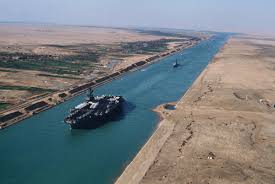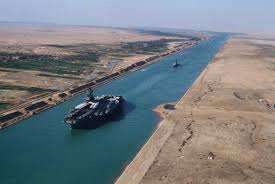
Retailers Europe and the United States will likely find it hard to keep products in stock during the coronavirus pandemic because of the blockage of the Suez Canal due to a stranded container ship.
It is estimated by experts that it would likely take weeks for rescuers to salvage the stranded ship and free up the Suez Canal – which was has been blocked since Tuesday. This crisis is the latest one to hit the global supply chain which was already upended by the Covid-19 lockdowns even as consumers locked at home continued to upgrade appliances, sofas, televisions and backyards.
Among the retailers whose goods are on the stranded vessel in IKEA, the largest furniture seller of the world and London-based electronics seller Dixons Carphone, both the company have said.
Goods in shipment are being delayed for the Amsterdam-based household goods seller Blokker, the retailer confirmed.
It could take weeks to dislodge the massive container ship Ever Given, which got stick stuck diagonally in the canal during a sand storm, said the salvage company overseeing the rescue effort.
An increase in imports of goods to Europe and the United States because of the surge in demand during the pandemic has resulted in empty containers being stranded in the wrong places, increased cargo rates and resulted in seaport bottlenecks that are impacting the entire transportation sector. The current situation now threatens ot make it worse.
“Ships, containers and goods are all in the wrong places,” said Douglas Kent, an executive vice at the Association for Supply Chain Management (ASCM).
Every year, about $9.6 billion in containerized goods - including exercise equipment, appliances, apparel to consumer electronics – use the Suez Canal, according to estimates by Lloyd’s List. Experts said that the canal is also used for the return journey to Asia of thousands of empty containers.
The ship that is stranded in the Suez Canal has about 110 containers of IKEA and the company is currently trying to find out how many additional boxes are present in the ships that are loaded in other vessels that are waiting to enter the channel.
“Depending on how this work proceeds and how long it takes to finish the operation, it may create constraints on our supply chain,” said Hannes Mård, spokesman for IKEA brand owner and franchiser Inter IKEA.
“This is a devastating event in an already stressed market, where high demand has caused congestion delays that keep import cargo from reaching store shelves in a timely fashion,” said Richard Roche, a sub-committee chairman at the National Customs Brokers & Forwarders Association of America.
Retailers of Europe face the highest risk of containers being delayed as there are already backlogs in the key seaports of Europe such as Antwerp in Belgium and Felixstowe in Britain. The East and Gulf Coasts of the United States are exposed to the Suez Canal crisis. According to experts, the canal is used for transportation for about 45 per cent of the cargo volume that arrives at the Port of New York & New Jersey.
There were no comments available on the crisis and the resultant delays by Walmart , which uses seaports in the Southeast and other parts of the country, as well as its online rival Amazon.com.
Announcements of possible losses of millions of dollars in shipping delay-related costs and product availability disruption were made recently by US companies such as Nike and Peloton.
The shipping industry is already contemplating rerouting of cargo ships and retailers now have to fight with other industries to find place on such ships for their cargo.
(Source:www.investing.com)
It is estimated by experts that it would likely take weeks for rescuers to salvage the stranded ship and free up the Suez Canal – which was has been blocked since Tuesday. This crisis is the latest one to hit the global supply chain which was already upended by the Covid-19 lockdowns even as consumers locked at home continued to upgrade appliances, sofas, televisions and backyards.
Among the retailers whose goods are on the stranded vessel in IKEA, the largest furniture seller of the world and London-based electronics seller Dixons Carphone, both the company have said.
Goods in shipment are being delayed for the Amsterdam-based household goods seller Blokker, the retailer confirmed.
It could take weeks to dislodge the massive container ship Ever Given, which got stick stuck diagonally in the canal during a sand storm, said the salvage company overseeing the rescue effort.
An increase in imports of goods to Europe and the United States because of the surge in demand during the pandemic has resulted in empty containers being stranded in the wrong places, increased cargo rates and resulted in seaport bottlenecks that are impacting the entire transportation sector. The current situation now threatens ot make it worse.
“Ships, containers and goods are all in the wrong places,” said Douglas Kent, an executive vice at the Association for Supply Chain Management (ASCM).
Every year, about $9.6 billion in containerized goods - including exercise equipment, appliances, apparel to consumer electronics – use the Suez Canal, according to estimates by Lloyd’s List. Experts said that the canal is also used for the return journey to Asia of thousands of empty containers.
The ship that is stranded in the Suez Canal has about 110 containers of IKEA and the company is currently trying to find out how many additional boxes are present in the ships that are loaded in other vessels that are waiting to enter the channel.
“Depending on how this work proceeds and how long it takes to finish the operation, it may create constraints on our supply chain,” said Hannes Mård, spokesman for IKEA brand owner and franchiser Inter IKEA.
“This is a devastating event in an already stressed market, where high demand has caused congestion delays that keep import cargo from reaching store shelves in a timely fashion,” said Richard Roche, a sub-committee chairman at the National Customs Brokers & Forwarders Association of America.
Retailers of Europe face the highest risk of containers being delayed as there are already backlogs in the key seaports of Europe such as Antwerp in Belgium and Felixstowe in Britain. The East and Gulf Coasts of the United States are exposed to the Suez Canal crisis. According to experts, the canal is used for transportation for about 45 per cent of the cargo volume that arrives at the Port of New York & New Jersey.
There were no comments available on the crisis and the resultant delays by Walmart , which uses seaports in the Southeast and other parts of the country, as well as its online rival Amazon.com.
Announcements of possible losses of millions of dollars in shipping delay-related costs and product availability disruption were made recently by US companies such as Nike and Peloton.
The shipping industry is already contemplating rerouting of cargo ships and retailers now have to fight with other industries to find place on such ships for their cargo.
(Source:www.investing.com)





